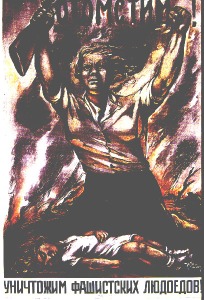The most interesting thing that war brings is the need for romance and love when it seems unreachable. Poems, songs and movies all brought forward a surge of romance that was needed for the dying population of the Soviet Union. Many couples that were ripped in two relied on poems such as Wait For Me by Konstantin Simonov and songs such as Dark Is The Night sang by Mark Bernes in the movie “Two Soldiers”. As hard it is to fight a war, most soldiers had already accepted the realization that they may not come back to their families, significant others, or lovers. The same was true for those left behind; the saying “absence makes the heart grow fonder” was very real in this situation and it was embraced.
The poem Wait For Me by Konstantin Simonov (the English translation here) was an almost symbolic representation of the hope that romance gave to these families and couples. It slowed down the tracks of demoralization of the population and it provided for the sadness that war brings to be expressed in a positive manner. The same could be said about the song called Dark Is The Night which is set in the context of a man singing it to his lover while he’s in the trenches with the sounds of war in the background.
Those that would not wait.
They will never understand
How amidst the strife,
By your waiting for me, dear,
You had saved my life.
Only you and I will know
How you got me through.
Simply – you knew how to wait –
No one else but you.-Ending Verse of Wait For Me
However, the strife of love and romance also brought the need to riot and protect those that were lost. Propaganda was released that showed the anger of mothers losing their sons to the war and those that never came back and had become missing-in-action
. 
“We Shall Have Our Revenge!” Propaganda from 1941.
Other images relaying different feelings such as women standing behind their soldiers and supporting them can also be found here. Love took many different tones throughout the war; whether it be the need for reunion, the strife of a lost one, or the support needed to fight a war.
Sources:
Seventeen Moments: Love and Romance in War (http://soviethistory.msu.edu/1943-2/love-and-romance-in-war/)

Interesting post Abigail. I wonder what role, if any, the state played in promoting or discouraging the propaganda against the war?
LikeLike
Great post! I’m not one for poetry, but it was interesting to read about love and emotion, rather than the vast battles during this time period. I could only imagine the struggle for soldiers and loved ones during the war. I’d imagine some of them found poetry and songs with meaningful lyrics as a coping method.
LikeLike
This was a really good post considering this is probably one of the factors that is overlooked the most when it comes to war. I read in another blog post that soldiers were not granted any sort of leave during the war and that some fought for up to four years without ever going home. The amount of stress and heartache that results from that is unfathomable. Loved ones had every right to be upset with the lack of effort by the Soviet Union to allow soldiers to see their family members that had gone off to war.
LikeLike
When you talk about the Soviet Union, you do not often think about romance and love, however during WWII, as you detail, there was a great increase in romanticized literature. If not already evident by the Soviets referring to the war as ‘the Great Patriotic War’, a great deal of sentimentalism and idealist propaganda was being produced. A lot of this stemmed directly from the poetry of the era and the strong emotional undercurrent from which it fed. During the war, love became another tool to fuel the war machine and the advance across the Eastern Front. Solid post this week!
LikeLike
This was a great post. I loved the propaganda poster you incorporated to show the grief and anger held by women when loved ones failed to return home. I also, wrote about this for my blog and found it interesting that Soviet people embraced these poems and songs that captured the idea of men protecting the women when their society was one of the more advanced societies when it came to women have the same equality as men. Also, it is interesting to look at the similarities between the Soviet Union and American music and movies during the war as well: romance was not constrained to national boundaries.
LikeLike